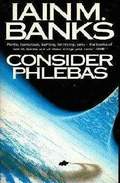
| Publisher: | Orbit |
| Copyright: | 1987 |
| Printing: | 2002 |
| ISBN: | 1-85723-138-4 |
| Format: | Trade paperback |
| Pages: | 471 |
Feeling a bit bogged down in Little, Big, I decided to take a break with some space opera and started on the Banks I'd not read. This is his first SF novel and the first book set in the Culture universe, a technolgical civilization of universal prosperity and machine intelligences most notable for its wonderfully named spaceship AIs and its look at what one does when one can do anything.
This book, though, isn't set in the Culture directly. The events of Consider Phlebas happen around the edges of the Culture's war with the Idirans, a race of fanatically religious, biologically immortal, and very loud creatures whose belief system is never particularly well-explained. The viewpoint character is a spy and mimic working for the Idirans against the Culture, mostly because he deeply distrusts the power the Culture has given to intelligent machines. Skulduggery, untrustworthy characters, dramatic escapes, and impressive mass destruction ensue, building up to an extended set piece involving trains, radioactivity, buried command bunkers, and an excess of personal weaponry.
In short, it's a space opera, and a reasonably enjoyable one, although I do have some quibbles with the pacing. Most of the book moves along fairly well, but the plot then comes to a screeching halt before the last three chapters and meanders about while tension is painstakingly built and people are moved into place for the repeatedly foreshadowed set piece finale. To add insult to injury, said finale ends up being rather unsatisfying; it was apt, and added an interesting bit of depth and a nice epilogue, but still I couldn't escape the feeling that the universe let out a long breath and said, "Well, now that's over with, on with more interesting business."
Maybe I've been spoiled by having already read Excession and Look to Windward, but Consider Phlebas had the feeling of a collection of interesting ideas that failed somehow to come off completely. Partly I think that's because it had a bit of a staged feel to it, with the characters moving from one unrelated setting to another. There were always solid plot-related reasons for their actions, of course, but however impressive the locations, they seem oddly disjointed and often irrelevant to the conclusion of the story. The island inhabited by a bizarre and utterly disgusting religious cult, on which the hero was stranded for a chapter or so, was the most egregious example for me. The scene is memorable mostly for its horror, but looking back on it from the end of the book, it was extraneous to anything else that happened and had no thematic connection or character development reason to have happened. Maybe I just missed something.
That being said, some of those unrelated settings contained great ideas and memorable images (I loved the card game), and the book as a whole was an enjoyable diversion. It satisfied my craving for space opera and managed to put a mildly thought-provoking twist on the ending (and then Banks tacked on a highly enjoyable set of appendices giving the story of the war from different perspectives). I'm very glad Banks went on to write books more focused on the bits that I find fascinating about his future world, most of which get cameo roles at best here, but this is a decent book if you're not expecting too much.
Reviewed: 2005-03-20